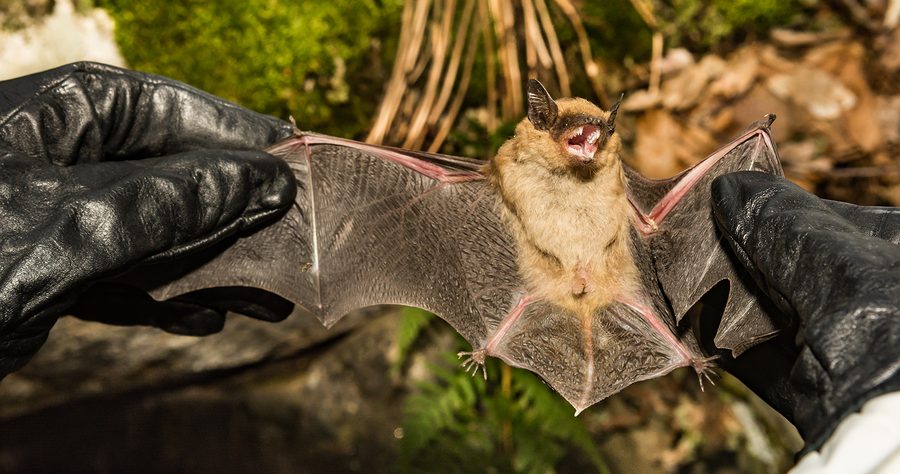Zoonotic viruses are those than can pass from one animal to another, and bats are known hosts to more than 60 of them. Furthermore, they are carriers of several other infectious viruses, bacteria, and parasites. However, just because a bat is a host does not mean they are infected, or even contagious.
Continue reading to review the most frequently asked questions about bats and disease.

What Diseases Can Bats Spread?
Bats are most known for being carriers of the Rabies virus. It is also possible for bats to carry the SARS virus (severe acute respiratory syndrome), however, it is rare, and the transmission from bat to human is even rarer. Other than zoonotic viruses, bats can also cause additional health concerns.
Their droppings (guano) can grow fungi spores (Histoplasma Capsulatum) that become airborne. If inhaled, it can cause a respiratory illness known as Histoplasmosis, which can be incredibly severe for young children, elderly folks, and those with weakened immune systems. Bats can also cause parasitic outbreaks, including lice, bat mites, bed bugs, and fleas.
Is Rabies Fatal for Humans?
When a human has contracted rabies, they will start to display particular signs, in which case they will need to go to the emergency room immediately. These signs will appear similar to the flu or common cold, with symptoms like headache and fever. As the virus progresses, other signs such as dizziness, rage, and confusion.
The incubation period for rabies in the average person is about five to seven days. All cases of rabies in humans were fatal until the vaccine was invented in the early 1900’s. Now, if a person is ever infected with Rabies, he or she can go to the emergency room and receive effective treatment to stop the virus from multiplying.
Can Dogs and Cats Catch Diseases From Bats?
All of these illnesses and parasites can all be transmitted to both people and pets. It is important to have your pet properly vaccinated every year to prevent complications or fatalities that result from a wild animal attack or bite. Common pet vaccines include: Rabies, Leptospirosis, Bordetella, Distemper, Parvovirus, Adenovirus, and Parainfluenza. Vaccinations are important for humans as well, especially children and those with weakened immune systems.
How Do Bats Transfer Disease?
The most common means of bacterial or viral transmission is through blood or saliva. This often occurs in the form of a bat bite or scratch. In most cases, a person bitten by a bat will be instructed to immediately seek medical attention. In the case that you or a loved one is bitten by a wild animal, it is important to call your doctor immediately. Depending on the description of the bat and the boosters you have one file, your doctor will determine whether or not you need emergency services. If a pet is bitten, take them to the emergency vert clinic right away.
Which Illnesses Only Infect Bats?
There are some diseases that can affect bats, but cannot be transmitted to other mammals. The most common disease is called White Nose Syndrome (WNS). It gets its name from the distinctive symptoms it causes in bats, namely a white fungal growth on their noses, muzzles, and other areas of the body.
Geomyces destructans is a newly-discovered fungus that is suspected to cause White Nose Syndrome in bats. Bats infected with WNS will show strange signs and exhibit odd behaviors. This includes daytime activity and clustering near the entry points of their roost. In North America, this disease is spreading quickly among Microchiroptera populations, and has caused millions of bat fatalities.
Managing Nuisance Bat Problems in Louisville
If bats are a nuisance in or around your property, contact 502-553-7622 for safe and non-lethal bat removal and control in Louisville, Kentucky. We are DNR licensed and insured bat control contractors who use safe, non-lethal methods of extraction and exclusion. We serve both residential and commercial clients, and at the most competitive prices in town. Emergency 24 hour service is also available. Request a free estimate, today.


